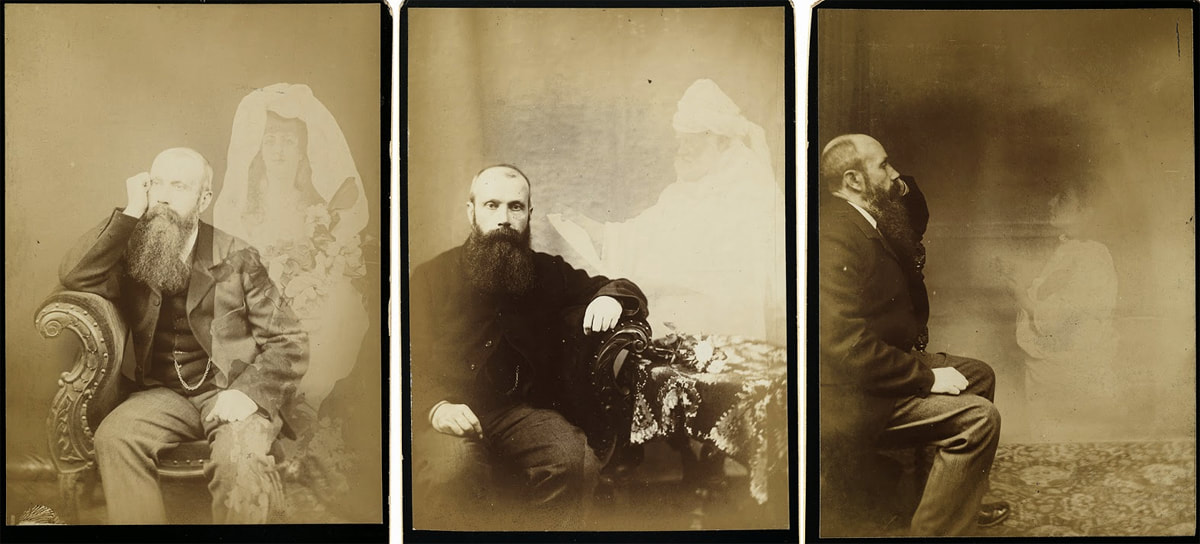|
This article originally appeared in the journal Paranthropology Vol.2 No.1 The variety of cross-cultural mediumistic phenomena is substantial. On the surface there seems only a limited relationship between phenomena such as: mass possessions observed during various religious festivals; a spirit medium who takes on the characteristics and mannerisms of a particular divinity while advising people of their fortune; and the contemporary platform medium who, with apparent ease, converses with the deceased relatives of their audience. Structurally, however, they all share common traits. Ardent skeptics, or in my view cynics, claim that they share the trait that the person experiencing the possession or mediumistic phenomena is either delusional, suffering a mental illness, or deliberately exploiting the gullibility of others (Devereux 1939, Lewis 1971).
Because these authors are utterly certain that consciousness cannot exist beyond physical matter, they are comfortable in stating categorically that mediumship, wherever it may occur in the world, is merely a social and psychological phenomena and cannot be what it purports to be. In the previous issue of this journal I have argued for an alternative paradigm that is based on an acceptance of the existence of consciousness beyond the physical body (McCaul 2010). The adoption of this “consciential paradigm”, i.e. a paradigm that centers on consciousness rather than on physical matter (Vieira 1994), does not imply that we accept all reports of mediumship uncritically. For example, within cultures which embrace non-physical realities, social power and prestige can be conferred to those who demonstrate mediumistic abilities. Where status and privilege arises on the basis of perceptions that others cannot verify, there is significant room and incentive for deceit and manipulation. While we as anthropologists must maintain our critical thinking, this does not mean we must confine our thinking to the parameters imposed by our society. Instead of being limited to looking at the social manifestation of mediumship, we can embrace its experiential dimension. This does not mean we must necessarily be practicing mediums, but some degree of personal experience with mediumistic phenomena is essential for a full understanding of the phenomenon. On the basis of such direct understanding, we can treat the experience as what it purports to be and embark on a serious study of the cross-cultural differences of inter-dimensional communication. In other words, by widening our focus we will be able to pursue research into the different ways extraphysical consciousnesses (i.e. spirits) engage and interact with intraphysical consciousnesses (i.e. humans and other animals) across cultures. In doing so we can increase our understanding, not only of the variety of social structures that surround mediumship, but of the variety of inter-dimensional dynamics of consciousness around the world. Such an inquiry would be groundbreaking, as multidimensional experiences have historically largely been ignored by a science that has considered them a priori unscientific. Bringing genuine open-minded scientific rigour to them, however, is arguably essential to developing a real understanding of a multiplicity of experiences that is all too easily dismissed as illogical (Turner 1992). Like the conventional paradigm, the consciential paradigm also highlights a certain commonality between the different possession and mediumistic phenomena found across the world. Instead of this commonality being delusion or deceit, however, it is that mediums are potentially intermediaries between dimensions; they are channels allowing non-physical consciousness a “voice” in this physical dimension. In some cases, this voice is confined to physical action, such as when the entranced person dances and expresses the physical features of the possessing extraphysical consciousness. In others there is speech and personal communication, but in a way uncontrolled by the medium. Finally, the medium maintains independent control, basically engaging in a three-way dialogue with the extraphysical consciousness and the physical recipient of the messages it conveys. No doubt there are numerous other varieties and hybrid forms of mediumship. But before we can engage in a serious exercise of classification and analysis we will need to decide on our paradigm. In my view, once we accept the challenge to approach mediumistic and possession phenomena through the consciential paradigm we will open up entirely new avenues of exploration that have the potential to make a significant contribution to our understanding of the life of consciousness across cultures and dimensions. References Devereux, George. 1939. Maladjustment and social neurosis. American Sociological Review 4: 844-851. Lewis, I. M. 1971. Ecstatic Religion: An Anthropological Study of Spirit Possession and Shamanism. Middlesex: Penguin. McCaul, Kim 2010. An experiential paradigm for the anthropology of consciousness. Paranthropology 1(2):7-9 Turner, Edith. 1992 The reality of spirits. ReVision 15 (1): 28-32 Vieira, Waldo 1994. 700 Experimentos da Conscientiologia. Rio de Janeiro: Instituto Internacional de Projeciologia e Conscienciologia
0 Comments
Your comment will be posted after it is approved.
Leave a Reply. |
Details
AuthorKim McCaul is an anthropologist with a long term interest in understanding consciousness and personal transformation.
About this blogThis blog is about my interests in consciousness, energy, evolution and personal growth. My understanding of consciousness is strongly influenced by the discipline of conscientiology and I have a deep interest in exploring the relationship between culture and consciousness.
Have some inputI am often inspired by comments and questions from other people, so if there is something that interests you drop me a line and I will see if I can write something about the topic.
Support my workIf you enjoy something you read here consider supporting my work in this field by purchasing my book, which is available on any major online book store. It's a win-win as you will get a mind expanding read and I will feel the support and encouragement to write other mind expanding books. If you have read my book and enjoyed it please consider leaving a review of it on Amazon to help others find it. I am a great believer in creating community in the online space and sharing our passion for understanding consciousness is an excellent way of doing that.
Archives
November 2020
Categories
All
|
